Entrepreneurship and Small Business Management Essay: Desklib
VerifiedAdded on 2020/10/22
|12
|4291
|437
Essay
AI Summary
This essay provides a comprehensive analysis of entrepreneurship and small business management, covering various aspects such as different types of entrepreneurial ventures, their relationship to the typology of entrepreneurship, and the similarities and differences between public, private, and social sector businesses. It interprets data and statistics to illustrate the impact of micro and small businesses on the economy, highlighting their contribution to job creation, turnover, and innovation in the UK. The essay also explores the importance of small businesses and business start-ups to the growth of the social economy, emphasizing their role in addressing local demands and fostering economic development. Furthermore, it examines the characteristics and skills of successful entrepreneurs and how entrepreneurial personality reflects motivation and mindset. The essay concludes by acknowledging that background and experience can either hinder or foster entrepreneurship. Desklib provides access to this and other solved assignments for students.

ENTREPRENEURSHIP AND
SMALL BUSINESS
MANAGEMENT
SMALL BUSINESS
MANAGEMENT
Paraphrase This Document
Need a fresh take? Get an instant paraphrase of this document with our AI Paraphraser
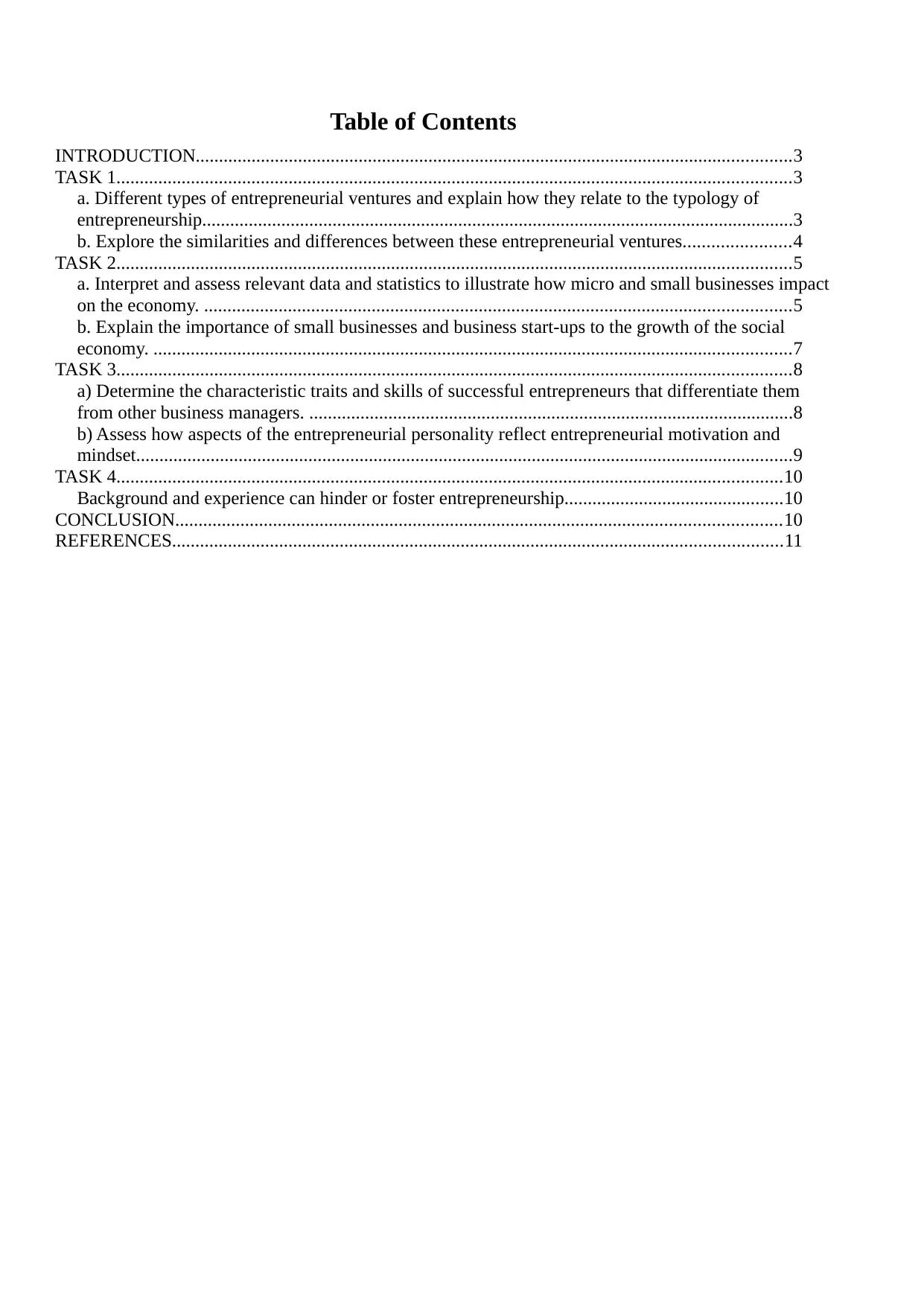
Table of Contents
INTRODUCTION................................................................................................................................3
TASK 1.................................................................................................................................................3
a. Different types of entrepreneurial ventures and explain how they relate to the typology of
entrepreneurship...............................................................................................................................3
b. Explore the similarities and differences between these entrepreneurial ventures.......................4
TASK 2.................................................................................................................................................5
a. Interpret and assess relevant data and statistics to illustrate how micro and small businesses impact
on the economy. ..............................................................................................................................5
b. Explain the importance of small businesses and business start-ups to the growth of the social
economy. .........................................................................................................................................7
TASK 3.................................................................................................................................................8
a) Determine the characteristic traits and skills of successful entrepreneurs that differentiate them
from other business managers. ........................................................................................................8
b) Assess how aspects of the entrepreneurial personality reflect entrepreneurial motivation and
mindset.............................................................................................................................................9
TASK 4...............................................................................................................................................10
Background and experience can hinder or foster entrepreneurship...............................................10
CONCLUSION..................................................................................................................................10
REFERENCES...................................................................................................................................11
INTRODUCTION................................................................................................................................3
TASK 1.................................................................................................................................................3
a. Different types of entrepreneurial ventures and explain how they relate to the typology of
entrepreneurship...............................................................................................................................3
b. Explore the similarities and differences between these entrepreneurial ventures.......................4
TASK 2.................................................................................................................................................5
a. Interpret and assess relevant data and statistics to illustrate how micro and small businesses impact
on the economy. ..............................................................................................................................5
b. Explain the importance of small businesses and business start-ups to the growth of the social
economy. .........................................................................................................................................7
TASK 3.................................................................................................................................................8
a) Determine the characteristic traits and skills of successful entrepreneurs that differentiate them
from other business managers. ........................................................................................................8
b) Assess how aspects of the entrepreneurial personality reflect entrepreneurial motivation and
mindset.............................................................................................................................................9
TASK 4...............................................................................................................................................10
Background and experience can hinder or foster entrepreneurship...............................................10
CONCLUSION..................................................................................................................................10
REFERENCES...................................................................................................................................11
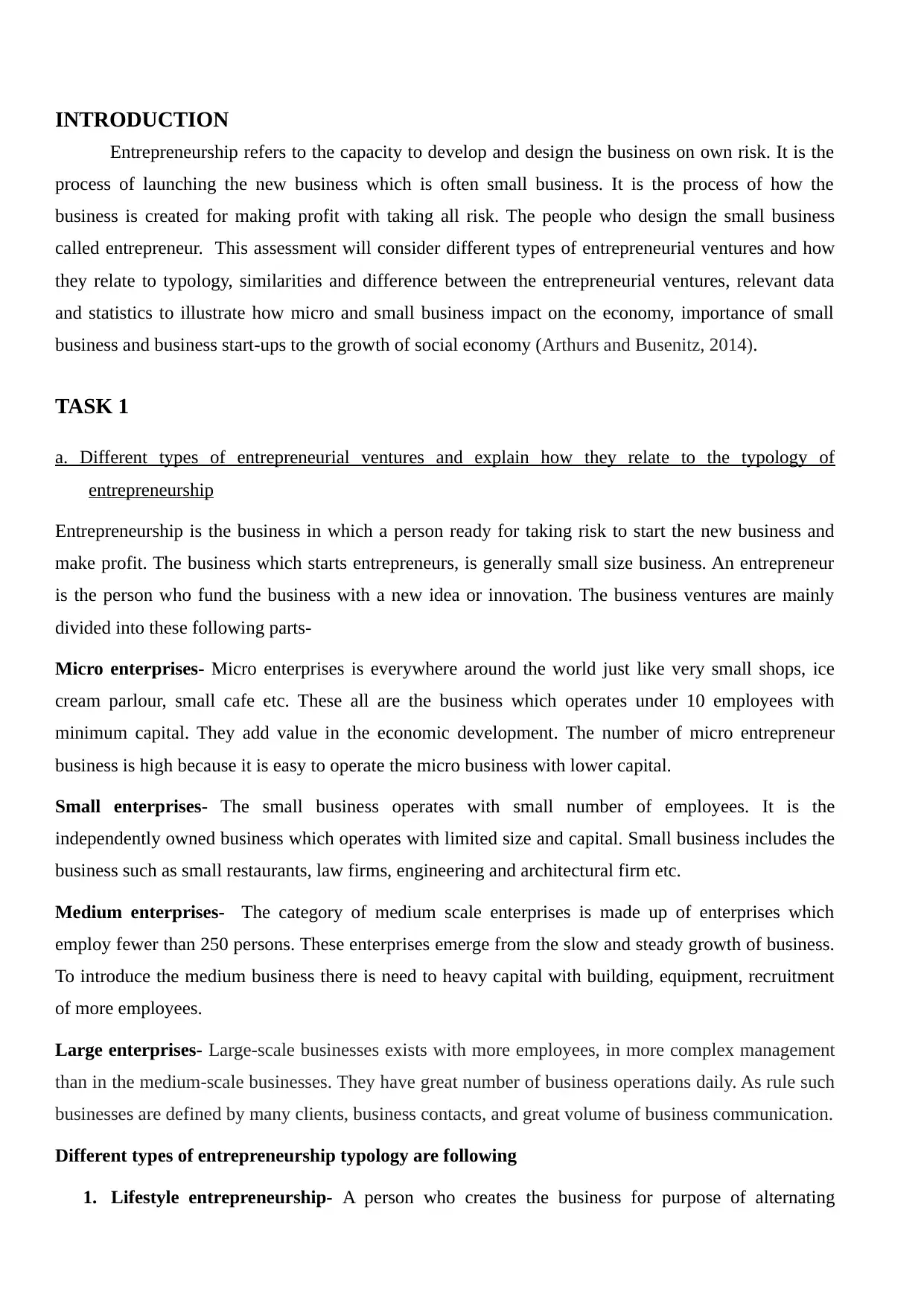
INTRODUCTION
Entrepreneurship refers to the capacity to develop and design the business on own risk. It is the
process of launching the new business which is often small business. It is the process of how the
business is created for making profit with taking all risk. The people who design the small business
called entrepreneur. This assessment will consider different types of entrepreneurial ventures and how
they relate to typology, similarities and difference between the entrepreneurial ventures, relevant data
and statistics to illustrate how micro and small business impact on the economy, importance of small
business and business start-ups to the growth of social economy (Arthurs and Busenitz, 2014).
TASK 1
a. Different types of entrepreneurial ventures and explain how they relate to the typology of
entrepreneurship
Entrepreneurship is the business in which a person ready for taking risk to start the new business and
make profit. The business which starts entrepreneurs, is generally small size business. An entrepreneur
is the person who fund the business with a new idea or innovation. The business ventures are mainly
divided into these following parts-
Micro enterprises- Micro enterprises is everywhere around the world just like very small shops, ice
cream parlour, small cafe etc. These all are the business which operates under 10 employees with
minimum capital. They add value in the economic development. The number of micro entrepreneur
business is high because it is easy to operate the micro business with lower capital.
Small enterprises- The small business operates with small number of employees. It is the
independently owned business which operates with limited size and capital. Small business includes the
business such as small restaurants, law firms, engineering and architectural firm etc.
Medium enterprises- The category of medium scale enterprises is made up of enterprises which
employ fewer than 250 persons. These enterprises emerge from the slow and steady growth of business.
To introduce the medium business there is need to heavy capital with building, equipment, recruitment
of more employees.
Large enterprises- Large-scale businesses exists with more employees, in more complex management
than in the medium-scale businesses. They have great number of business operations daily. As rule such
businesses are defined by many clients, business contacts, and great volume of business communication.
Different types of entrepreneurship typology are following
1. Lifestyle entrepreneurship- A person who creates the business for purpose of alternating
Entrepreneurship refers to the capacity to develop and design the business on own risk. It is the
process of launching the new business which is often small business. It is the process of how the
business is created for making profit with taking all risk. The people who design the small business
called entrepreneur. This assessment will consider different types of entrepreneurial ventures and how
they relate to typology, similarities and difference between the entrepreneurial ventures, relevant data
and statistics to illustrate how micro and small business impact on the economy, importance of small
business and business start-ups to the growth of social economy (Arthurs and Busenitz, 2014).
TASK 1
a. Different types of entrepreneurial ventures and explain how they relate to the typology of
entrepreneurship
Entrepreneurship is the business in which a person ready for taking risk to start the new business and
make profit. The business which starts entrepreneurs, is generally small size business. An entrepreneur
is the person who fund the business with a new idea or innovation. The business ventures are mainly
divided into these following parts-
Micro enterprises- Micro enterprises is everywhere around the world just like very small shops, ice
cream parlour, small cafe etc. These all are the business which operates under 10 employees with
minimum capital. They add value in the economic development. The number of micro entrepreneur
business is high because it is easy to operate the micro business with lower capital.
Small enterprises- The small business operates with small number of employees. It is the
independently owned business which operates with limited size and capital. Small business includes the
business such as small restaurants, law firms, engineering and architectural firm etc.
Medium enterprises- The category of medium scale enterprises is made up of enterprises which
employ fewer than 250 persons. These enterprises emerge from the slow and steady growth of business.
To introduce the medium business there is need to heavy capital with building, equipment, recruitment
of more employees.
Large enterprises- Large-scale businesses exists with more employees, in more complex management
than in the medium-scale businesses. They have great number of business operations daily. As rule such
businesses are defined by many clients, business contacts, and great volume of business communication.
Different types of entrepreneurship typology are following
1. Lifestyle entrepreneurship- A person who creates the business for purpose of alternating
⊘ This is a preview!⊘
Do you want full access?
Subscribe today to unlock all pages.

Trusted by 1+ million students worldwide
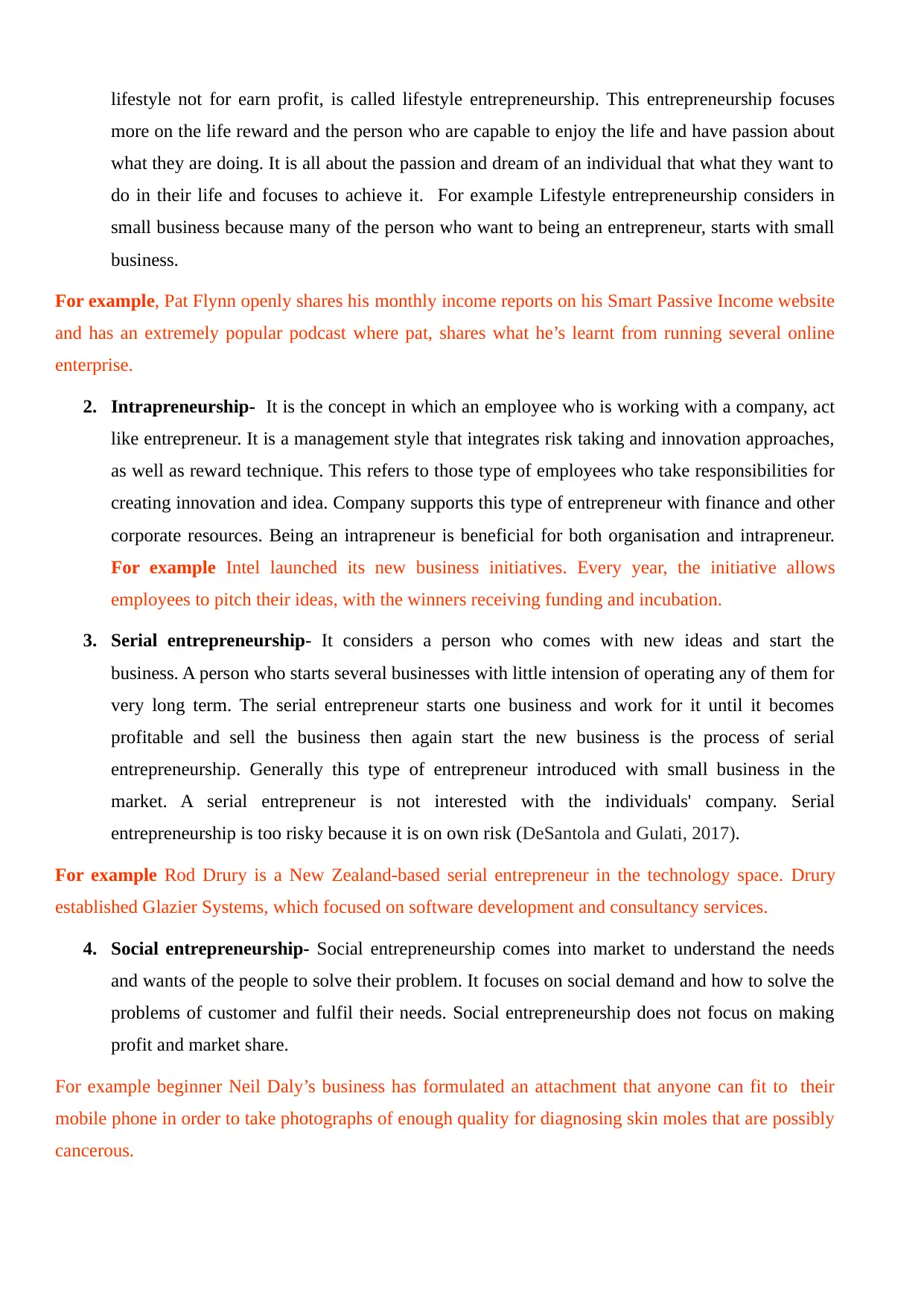
lifestyle not for earn profit, is called lifestyle entrepreneurship. This entrepreneurship focuses
more on the life reward and the person who are capable to enjoy the life and have passion about
what they are doing. It is all about the passion and dream of an individual that what they want to
do in their life and focuses to achieve it. For example Lifestyle entrepreneurship considers in
small business because many of the person who want to being an entrepreneur, starts with small
business.
For example, Pat Flynn openly shares his monthly income reports on his Smart Passive Income website
and has an extremely popular podcast where pat, shares what he’s learnt from running several online
enterprise.
2. Intrapreneurship- It is the concept in which an employee who is working with a company, act
like entrepreneur. It is a management style that integrates risk taking and innovation approaches,
as well as reward technique. This refers to those type of employees who take responsibilities for
creating innovation and idea. Company supports this type of entrepreneur with finance and other
corporate resources. Being an intrapreneur is beneficial for both organisation and intrapreneur.
For example Intel launched its new business initiatives. Every year, the initiative allows
employees to pitch their ideas, with the winners receiving funding and incubation.
3. Serial entrepreneurship- It considers a person who comes with new ideas and start the
business. A person who starts several businesses with little intension of operating any of them for
very long term. The serial entrepreneur starts one business and work for it until it becomes
profitable and sell the business then again start the new business is the process of serial
entrepreneurship. Generally this type of entrepreneur introduced with small business in the
market. A serial entrepreneur is not interested with the individuals' company. Serial
entrepreneurship is too risky because it is on own risk (DeSantola and Gulati, 2017).
For example Rod Drury is a New Zealand-based serial entrepreneur in the technology space. Drury
established Glazier Systems, which focused on software development and consultancy services.
4. Social entrepreneurship- Social entrepreneurship comes into market to understand the needs
and wants of the people to solve their problem. It focuses on social demand and how to solve the
problems of customer and fulfil their needs. Social entrepreneurship does not focus on making
profit and market share.
For example beginner Neil Daly’s business has formulated an attachment that anyone can fit to their
mobile phone in order to take photographs of enough quality for diagnosing skin moles that are possibly
cancerous.
more on the life reward and the person who are capable to enjoy the life and have passion about
what they are doing. It is all about the passion and dream of an individual that what they want to
do in their life and focuses to achieve it. For example Lifestyle entrepreneurship considers in
small business because many of the person who want to being an entrepreneur, starts with small
business.
For example, Pat Flynn openly shares his monthly income reports on his Smart Passive Income website
and has an extremely popular podcast where pat, shares what he’s learnt from running several online
enterprise.
2. Intrapreneurship- It is the concept in which an employee who is working with a company, act
like entrepreneur. It is a management style that integrates risk taking and innovation approaches,
as well as reward technique. This refers to those type of employees who take responsibilities for
creating innovation and idea. Company supports this type of entrepreneur with finance and other
corporate resources. Being an intrapreneur is beneficial for both organisation and intrapreneur.
For example Intel launched its new business initiatives. Every year, the initiative allows
employees to pitch their ideas, with the winners receiving funding and incubation.
3. Serial entrepreneurship- It considers a person who comes with new ideas and start the
business. A person who starts several businesses with little intension of operating any of them for
very long term. The serial entrepreneur starts one business and work for it until it becomes
profitable and sell the business then again start the new business is the process of serial
entrepreneurship. Generally this type of entrepreneur introduced with small business in the
market. A serial entrepreneur is not interested with the individuals' company. Serial
entrepreneurship is too risky because it is on own risk (DeSantola and Gulati, 2017).
For example Rod Drury is a New Zealand-based serial entrepreneur in the technology space. Drury
established Glazier Systems, which focused on software development and consultancy services.
4. Social entrepreneurship- Social entrepreneurship comes into market to understand the needs
and wants of the people to solve their problem. It focuses on social demand and how to solve the
problems of customer and fulfil their needs. Social entrepreneurship does not focus on making
profit and market share.
For example beginner Neil Daly’s business has formulated an attachment that anyone can fit to their
mobile phone in order to take photographs of enough quality for diagnosing skin moles that are possibly
cancerous.
Paraphrase This Document
Need a fresh take? Get an instant paraphrase of this document with our AI Paraphraser
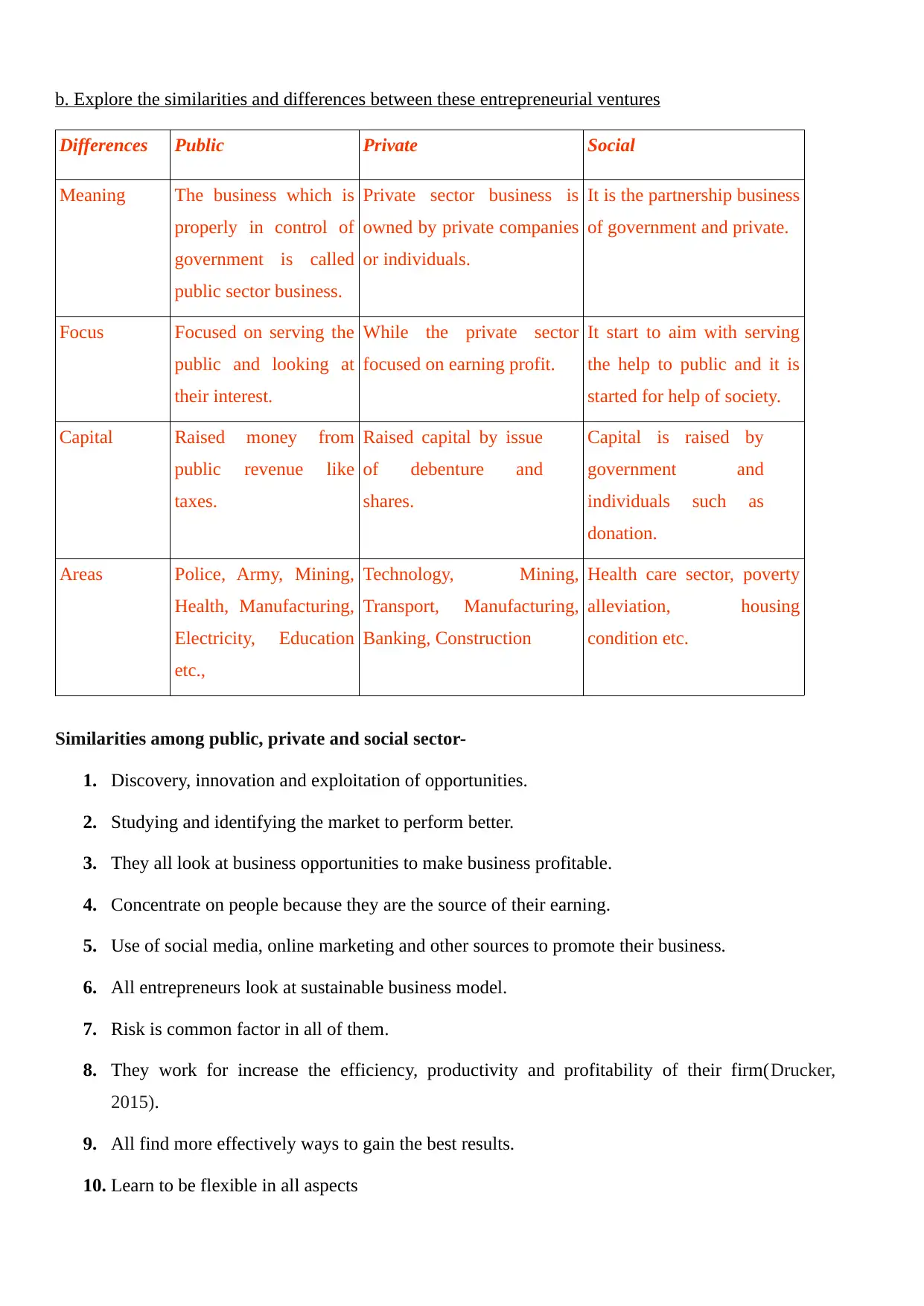
b. Explore the similarities and differences between these entrepreneurial ventures
Differences Public Private Social
Meaning The business which is
properly in control of
government is called
public sector business.
Private sector business is
owned by private companies
or individuals.
It is the partnership business
of government and private.
Focus Focused on serving the
public and looking at
their interest.
While the private sector
focused on earning profit.
It start to aim with serving
the help to public and it is
started for help of society.
Capital Raised money from
public revenue like
taxes.
Raised capital by issue
of debenture and
shares.
Capital is raised by
government and
individuals such as
donation.
Areas Police, Army, Mining,
Health, Manufacturing,
Electricity, Education
etc.,
Technology, Mining,
Transport, Manufacturing,
Banking, Construction
Health care sector, poverty
alleviation, housing
condition etc.
Similarities among public, private and social sector-
1. Discovery, innovation and exploitation of opportunities.
2. Studying and identifying the market to perform better.
3. They all look at business opportunities to make business profitable.
4. Concentrate on people because they are the source of their earning.
5. Use of social media, online marketing and other sources to promote their business.
6. All entrepreneurs look at sustainable business model.
7. Risk is common factor in all of them.
8. They work for increase the efficiency, productivity and profitability of their firm(Drucker,
2015).
9. All find more effectively ways to gain the best results.
10. Learn to be flexible in all aspects
Differences Public Private Social
Meaning The business which is
properly in control of
government is called
public sector business.
Private sector business is
owned by private companies
or individuals.
It is the partnership business
of government and private.
Focus Focused on serving the
public and looking at
their interest.
While the private sector
focused on earning profit.
It start to aim with serving
the help to public and it is
started for help of society.
Capital Raised money from
public revenue like
taxes.
Raised capital by issue
of debenture and
shares.
Capital is raised by
government and
individuals such as
donation.
Areas Police, Army, Mining,
Health, Manufacturing,
Electricity, Education
etc.,
Technology, Mining,
Transport, Manufacturing,
Banking, Construction
Health care sector, poverty
alleviation, housing
condition etc.
Similarities among public, private and social sector-
1. Discovery, innovation and exploitation of opportunities.
2. Studying and identifying the market to perform better.
3. They all look at business opportunities to make business profitable.
4. Concentrate on people because they are the source of their earning.
5. Use of social media, online marketing and other sources to promote their business.
6. All entrepreneurs look at sustainable business model.
7. Risk is common factor in all of them.
8. They work for increase the efficiency, productivity and profitability of their firm(Drucker,
2015).
9. All find more effectively ways to gain the best results.
10. Learn to be flexible in all aspects
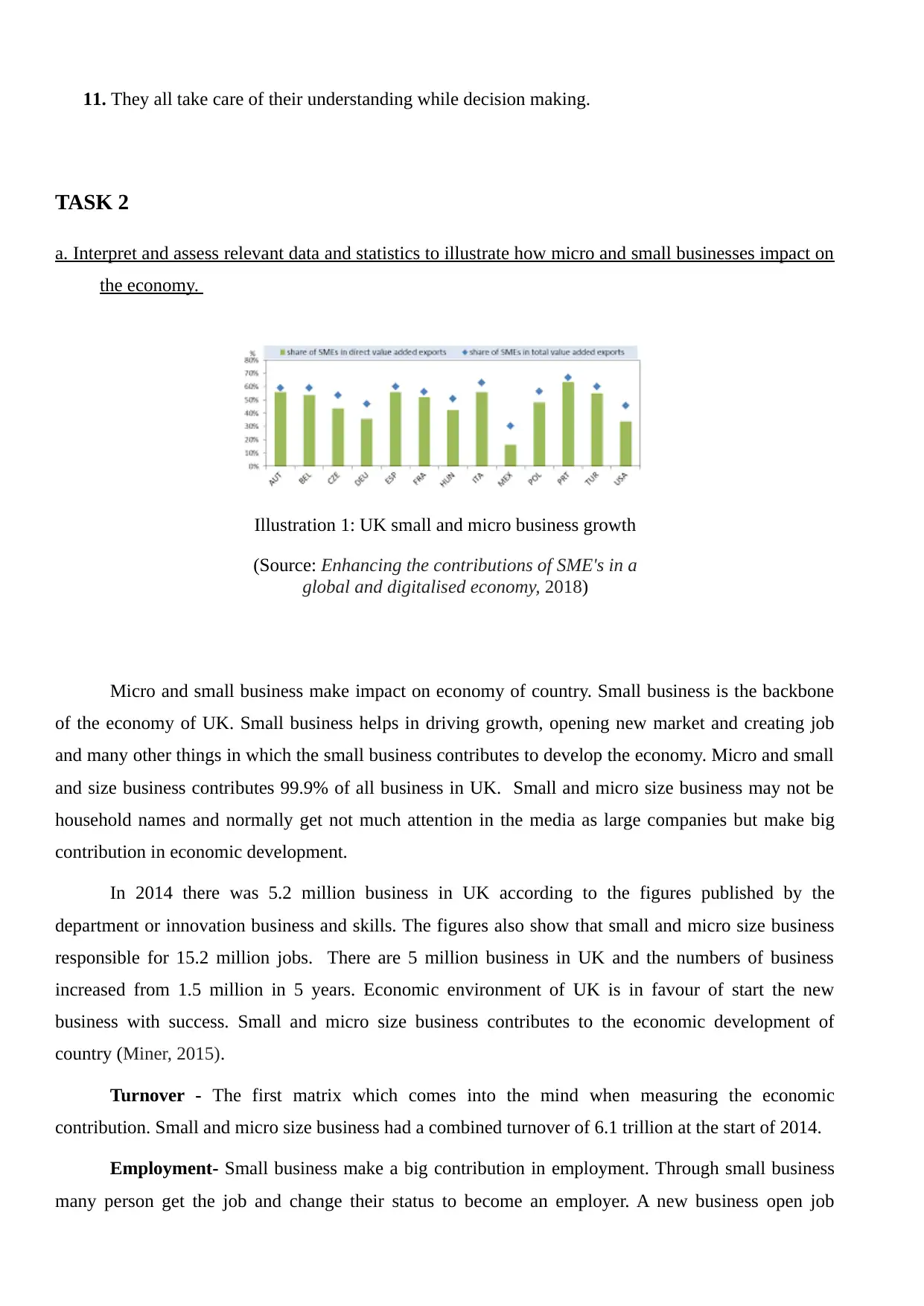
11. They all take care of their understanding while decision making.
TASK 2
a. Interpret and assess relevant data and statistics to illustrate how micro and small businesses impact on
the economy.
Micro and small business make impact on economy of country. Small business is the backbone
of the economy of UK. Small business helps in driving growth, opening new market and creating job
and many other things in which the small business contributes to develop the economy. Micro and small
and size business contributes 99.9% of all business in UK. Small and micro size business may not be
household names and normally get not much attention in the media as large companies but make big
contribution in economic development.
In 2014 there was 5.2 million business in UK according to the figures published by the
department or innovation business and skills. The figures also show that small and micro size business
responsible for 15.2 million jobs. There are 5 million business in UK and the numbers of business
increased from 1.5 million in 5 years. Economic environment of UK is in favour of start the new
business with success. Small and micro size business contributes to the economic development of
country (Miner, 2015).
Turnover - The first matrix which comes into the mind when measuring the economic
contribution. Small and micro size business had a combined turnover of 6.1 trillion at the start of 2014.
Employment- Small business make a big contribution in employment. Through small business
many person get the job and change their status to become an employer. A new business open job
Illustration 1: UK small and micro business growth
(Source: Enhancing the contributions of SME's in a
global and digitalised economy, 2018)
TASK 2
a. Interpret and assess relevant data and statistics to illustrate how micro and small businesses impact on
the economy.
Micro and small business make impact on economy of country. Small business is the backbone
of the economy of UK. Small business helps in driving growth, opening new market and creating job
and many other things in which the small business contributes to develop the economy. Micro and small
and size business contributes 99.9% of all business in UK. Small and micro size business may not be
household names and normally get not much attention in the media as large companies but make big
contribution in economic development.
In 2014 there was 5.2 million business in UK according to the figures published by the
department or innovation business and skills. The figures also show that small and micro size business
responsible for 15.2 million jobs. There are 5 million business in UK and the numbers of business
increased from 1.5 million in 5 years. Economic environment of UK is in favour of start the new
business with success. Small and micro size business contributes to the economic development of
country (Miner, 2015).
Turnover - The first matrix which comes into the mind when measuring the economic
contribution. Small and micro size business had a combined turnover of 6.1 trillion at the start of 2014.
Employment- Small business make a big contribution in employment. Through small business
many person get the job and change their status to become an employer. A new business open job
Illustration 1: UK small and micro business growth
(Source: Enhancing the contributions of SME's in a
global and digitalised economy, 2018)
⊘ This is a preview!⊘
Do you want full access?
Subscribe today to unlock all pages.

Trusted by 1+ million students worldwide
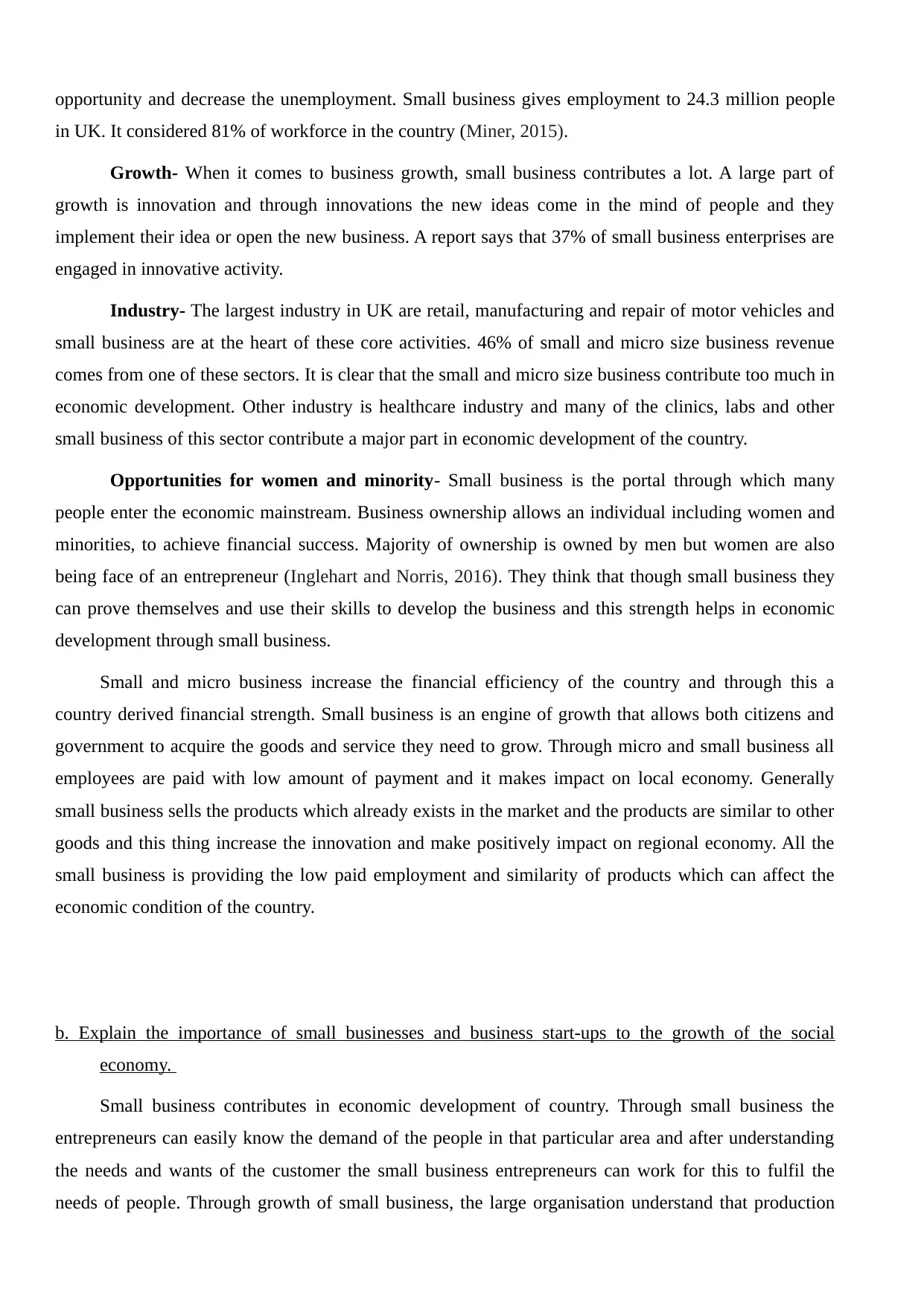
opportunity and decrease the unemployment. Small business gives employment to 24.3 million people
in UK. It considered 81% of workforce in the country (Miner, 2015).
Growth- When it comes to business growth, small business contributes a lot. A large part of
growth is innovation and through innovations the new ideas come in the mind of people and they
implement their idea or open the new business. A report says that 37% of small business enterprises are
engaged in innovative activity.
Industry- The largest industry in UK are retail, manufacturing and repair of motor vehicles and
small business are at the heart of these core activities. 46% of small and micro size business revenue
comes from one of these sectors. It is clear that the small and micro size business contribute too much in
economic development. Other industry is healthcare industry and many of the clinics, labs and other
small business of this sector contribute a major part in economic development of the country.
Opportunities for women and minority- Small business is the portal through which many
people enter the economic mainstream. Business ownership allows an individual including women and
minorities, to achieve financial success. Majority of ownership is owned by men but women are also
being face of an entrepreneur (Inglehart and Norris, 2016). They think that though small business they
can prove themselves and use their skills to develop the business and this strength helps in economic
development through small business.
Small and micro business increase the financial efficiency of the country and through this a
country derived financial strength. Small business is an engine of growth that allows both citizens and
government to acquire the goods and service they need to grow. Through micro and small business all
employees are paid with low amount of payment and it makes impact on local economy. Generally
small business sells the products which already exists in the market and the products are similar to other
goods and this thing increase the innovation and make positively impact on regional economy. All the
small business is providing the low paid employment and similarity of products which can affect the
economic condition of the country.
b. Explain the importance of small businesses and business start-ups to the growth of the social
economy.
Small business contributes in economic development of country. Through small business the
entrepreneurs can easily know the demand of the people in that particular area and after understanding
the needs and wants of the customer the small business entrepreneurs can work for this to fulfil the
needs of people. Through growth of small business, the large organisation understand that production
in UK. It considered 81% of workforce in the country (Miner, 2015).
Growth- When it comes to business growth, small business contributes a lot. A large part of
growth is innovation and through innovations the new ideas come in the mind of people and they
implement their idea or open the new business. A report says that 37% of small business enterprises are
engaged in innovative activity.
Industry- The largest industry in UK are retail, manufacturing and repair of motor vehicles and
small business are at the heart of these core activities. 46% of small and micro size business revenue
comes from one of these sectors. It is clear that the small and micro size business contribute too much in
economic development. Other industry is healthcare industry and many of the clinics, labs and other
small business of this sector contribute a major part in economic development of the country.
Opportunities for women and minority- Small business is the portal through which many
people enter the economic mainstream. Business ownership allows an individual including women and
minorities, to achieve financial success. Majority of ownership is owned by men but women are also
being face of an entrepreneur (Inglehart and Norris, 2016). They think that though small business they
can prove themselves and use their skills to develop the business and this strength helps in economic
development through small business.
Small and micro business increase the financial efficiency of the country and through this a
country derived financial strength. Small business is an engine of growth that allows both citizens and
government to acquire the goods and service they need to grow. Through micro and small business all
employees are paid with low amount of payment and it makes impact on local economy. Generally
small business sells the products which already exists in the market and the products are similar to other
goods and this thing increase the innovation and make positively impact on regional economy. All the
small business is providing the low paid employment and similarity of products which can affect the
economic condition of the country.
b. Explain the importance of small businesses and business start-ups to the growth of the social
economy.
Small business contributes in economic development of country. Through small business the
entrepreneurs can easily know the demand of the people in that particular area and after understanding
the needs and wants of the customer the small business entrepreneurs can work for this to fulfil the
needs of people. Through growth of small business, the large organisation understand that production
Paraphrase This Document
Need a fresh take? Get an instant paraphrase of this document with our AI Paraphraser
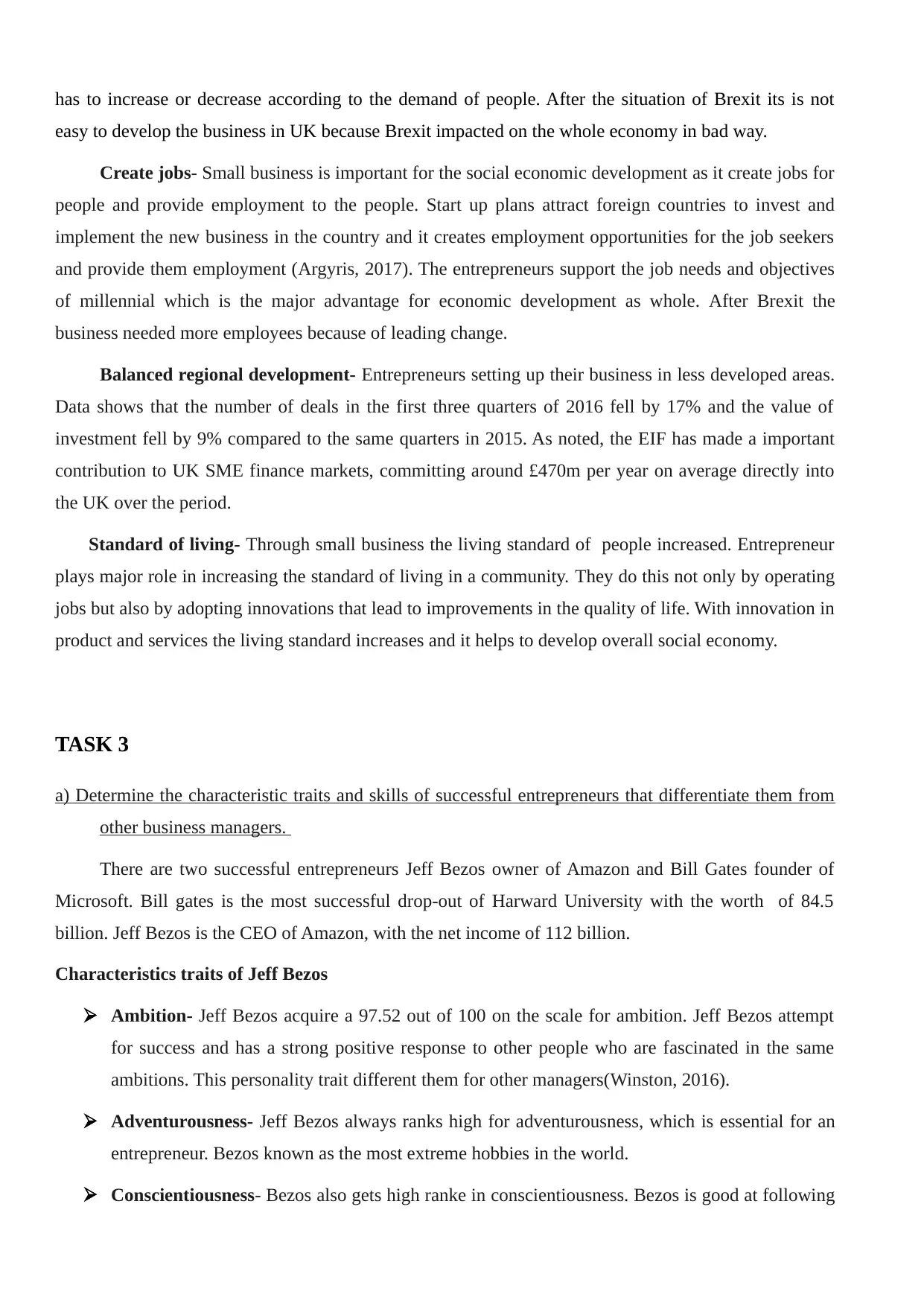
has to increase or decrease according to the demand of people. After the situation of Brexit its is not
easy to develop the business in UK because Brexit impacted on the whole economy in bad way.
Create jobs- Small business is important for the social economic development as it create jobs for
people and provide employment to the people. Start up plans attract foreign countries to invest and
implement the new business in the country and it creates employment opportunities for the job seekers
and provide them employment (Argyris, 2017). The entrepreneurs support the job needs and objectives
of millennial which is the major advantage for economic development as whole. After Brexit the
business needed more employees because of leading change.
Balanced regional development- Entrepreneurs setting up their business in less developed areas.
Data shows that the number of deals in the first three quarters of 2016 fell by 17% and the value of
investment fell by 9% compared to the same quarters in 2015. As noted, the EIF has made a important
contribution to UK SME finance markets, committing around £470m per year on average directly into
the UK over the period.
Standard of living- Through small business the living standard of people increased. Entrepreneur
plays major role in increasing the standard of living in a community. They do this not only by operating
jobs but also by adopting innovations that lead to improvements in the quality of life. With innovation in
product and services the living standard increases and it helps to develop overall social economy.
TASK 3
a) Determine the characteristic traits and skills of successful entrepreneurs that differentiate them from
other business managers.
There are two successful entrepreneurs Jeff Bezos owner of Amazon and Bill Gates founder of
Microsoft. Bill gates is the most successful drop-out of Harward University with the worth of 84.5
billion. Jeff Bezos is the CEO of Amazon, with the net income of 112 billion.
Characteristics traits of Jeff Bezos
Ambition- Jeff Bezos acquire a 97.52 out of 100 on the scale for ambition. Jeff Bezos attempt
for success and has a strong positive response to other people who are fascinated in the same
ambitions. This personality trait different them for other managers(Winston, 2016).
Adventurousness- Jeff Bezos always ranks high for adventurousness, which is essential for an
entrepreneur. Bezos known as the most extreme hobbies in the world.
Conscientiousness- Bezos also gets high ranke in conscientiousness. Bezos is good at following
easy to develop the business in UK because Brexit impacted on the whole economy in bad way.
Create jobs- Small business is important for the social economic development as it create jobs for
people and provide employment to the people. Start up plans attract foreign countries to invest and
implement the new business in the country and it creates employment opportunities for the job seekers
and provide them employment (Argyris, 2017). The entrepreneurs support the job needs and objectives
of millennial which is the major advantage for economic development as whole. After Brexit the
business needed more employees because of leading change.
Balanced regional development- Entrepreneurs setting up their business in less developed areas.
Data shows that the number of deals in the first three quarters of 2016 fell by 17% and the value of
investment fell by 9% compared to the same quarters in 2015. As noted, the EIF has made a important
contribution to UK SME finance markets, committing around £470m per year on average directly into
the UK over the period.
Standard of living- Through small business the living standard of people increased. Entrepreneur
plays major role in increasing the standard of living in a community. They do this not only by operating
jobs but also by adopting innovations that lead to improvements in the quality of life. With innovation in
product and services the living standard increases and it helps to develop overall social economy.
TASK 3
a) Determine the characteristic traits and skills of successful entrepreneurs that differentiate them from
other business managers.
There are two successful entrepreneurs Jeff Bezos owner of Amazon and Bill Gates founder of
Microsoft. Bill gates is the most successful drop-out of Harward University with the worth of 84.5
billion. Jeff Bezos is the CEO of Amazon, with the net income of 112 billion.
Characteristics traits of Jeff Bezos
Ambition- Jeff Bezos acquire a 97.52 out of 100 on the scale for ambition. Jeff Bezos attempt
for success and has a strong positive response to other people who are fascinated in the same
ambitions. This personality trait different them for other managers(Winston, 2016).
Adventurousness- Jeff Bezos always ranks high for adventurousness, which is essential for an
entrepreneur. Bezos known as the most extreme hobbies in the world.
Conscientiousness- Bezos also gets high ranke in conscientiousness. Bezos is good at following
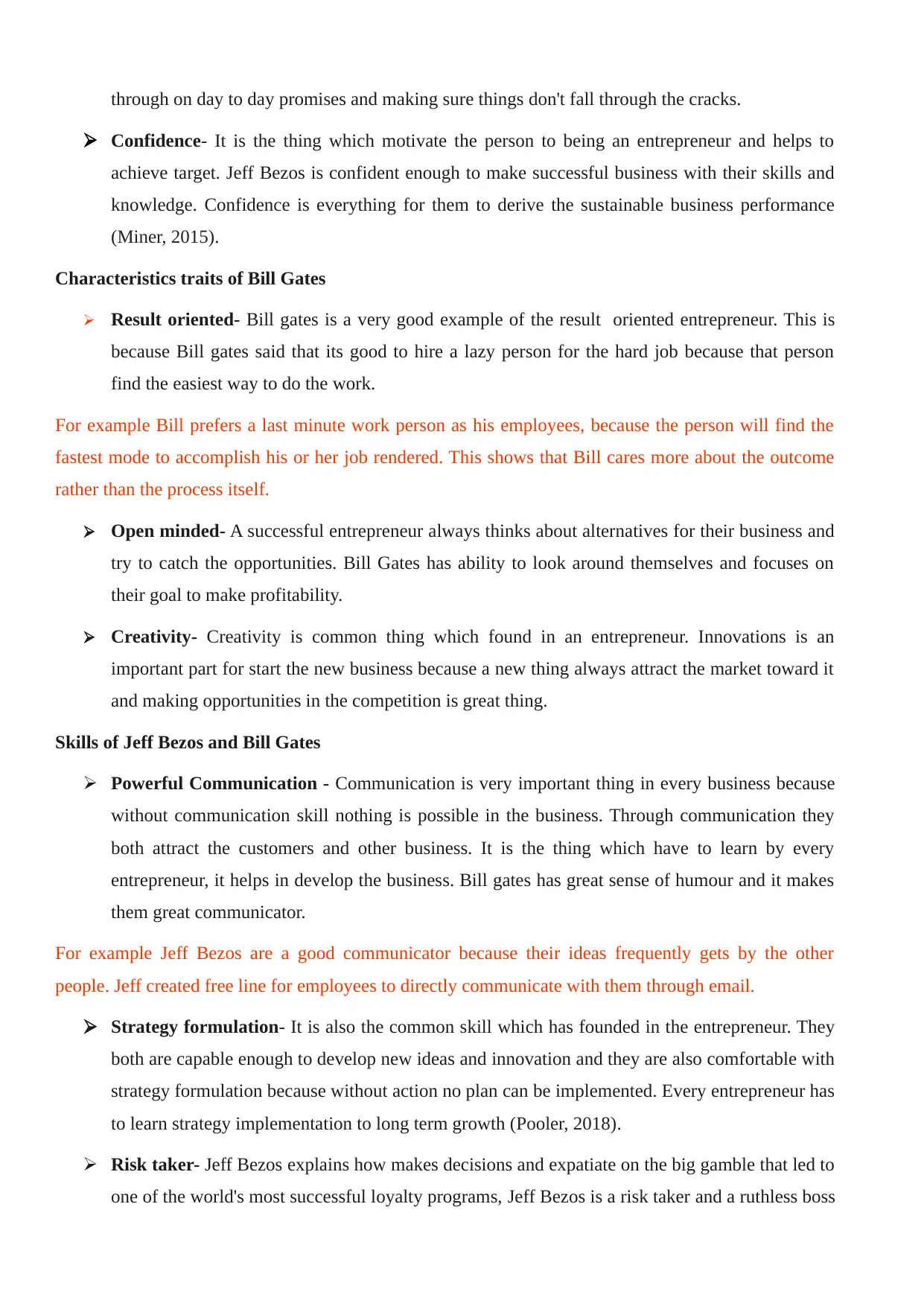
through on day to day promises and making sure things don't fall through the cracks.
Confidence- It is the thing which motivate the person to being an entrepreneur and helps to
achieve target. Jeff Bezos is confident enough to make successful business with their skills and
knowledge. Confidence is everything for them to derive the sustainable business performance
(Miner, 2015).
Characteristics traits of Bill Gates
Result oriented- Bill gates is a very good example of the result oriented entrepreneur. This is
because Bill gates said that its good to hire a lazy person for the hard job because that person
find the easiest way to do the work.
For example Bill prefers a last minute work person as his employees, because the person will find the
fastest mode to accomplish his or her job rendered. This shows that Bill cares more about the outcome
rather than the process itself.
Open minded- A successful entrepreneur always thinks about alternatives for their business and
try to catch the opportunities. Bill Gates has ability to look around themselves and focuses on
their goal to make profitability.
Creativity- Creativity is common thing which found in an entrepreneur. Innovations is an
important part for start the new business because a new thing always attract the market toward it
and making opportunities in the competition is great thing.
Skills of Jeff Bezos and Bill Gates
Powerful Communication - Communication is very important thing in every business because
without communication skill nothing is possible in the business. Through communication they
both attract the customers and other business. It is the thing which have to learn by every
entrepreneur, it helps in develop the business. Bill gates has great sense of humour and it makes
them great communicator.
For example Jeff Bezos are a good communicator because their ideas frequently gets by the other
people. Jeff created free line for employees to directly communicate with them through email.
Strategy formulation- It is also the common skill which has founded in the entrepreneur. They
both are capable enough to develop new ideas and innovation and they are also comfortable with
strategy formulation because without action no plan can be implemented. Every entrepreneur has
to learn strategy implementation to long term growth (Pooler, 2018).
Risk taker- Jeff Bezos explains how makes decisions and expatiate on the big gamble that led to
one of the world's most successful loyalty programs, Jeff Bezos is a risk taker and a ruthless boss
Confidence- It is the thing which motivate the person to being an entrepreneur and helps to
achieve target. Jeff Bezos is confident enough to make successful business with their skills and
knowledge. Confidence is everything for them to derive the sustainable business performance
(Miner, 2015).
Characteristics traits of Bill Gates
Result oriented- Bill gates is a very good example of the result oriented entrepreneur. This is
because Bill gates said that its good to hire a lazy person for the hard job because that person
find the easiest way to do the work.
For example Bill prefers a last minute work person as his employees, because the person will find the
fastest mode to accomplish his or her job rendered. This shows that Bill cares more about the outcome
rather than the process itself.
Open minded- A successful entrepreneur always thinks about alternatives for their business and
try to catch the opportunities. Bill Gates has ability to look around themselves and focuses on
their goal to make profitability.
Creativity- Creativity is common thing which found in an entrepreneur. Innovations is an
important part for start the new business because a new thing always attract the market toward it
and making opportunities in the competition is great thing.
Skills of Jeff Bezos and Bill Gates
Powerful Communication - Communication is very important thing in every business because
without communication skill nothing is possible in the business. Through communication they
both attract the customers and other business. It is the thing which have to learn by every
entrepreneur, it helps in develop the business. Bill gates has great sense of humour and it makes
them great communicator.
For example Jeff Bezos are a good communicator because their ideas frequently gets by the other
people. Jeff created free line for employees to directly communicate with them through email.
Strategy formulation- It is also the common skill which has founded in the entrepreneur. They
both are capable enough to develop new ideas and innovation and they are also comfortable with
strategy formulation because without action no plan can be implemented. Every entrepreneur has
to learn strategy implementation to long term growth (Pooler, 2018).
Risk taker- Jeff Bezos explains how makes decisions and expatiate on the big gamble that led to
one of the world's most successful loyalty programs, Jeff Bezos is a risk taker and a ruthless boss
⊘ This is a preview!⊘
Do you want full access?
Subscribe today to unlock all pages.

Trusted by 1+ million students worldwide
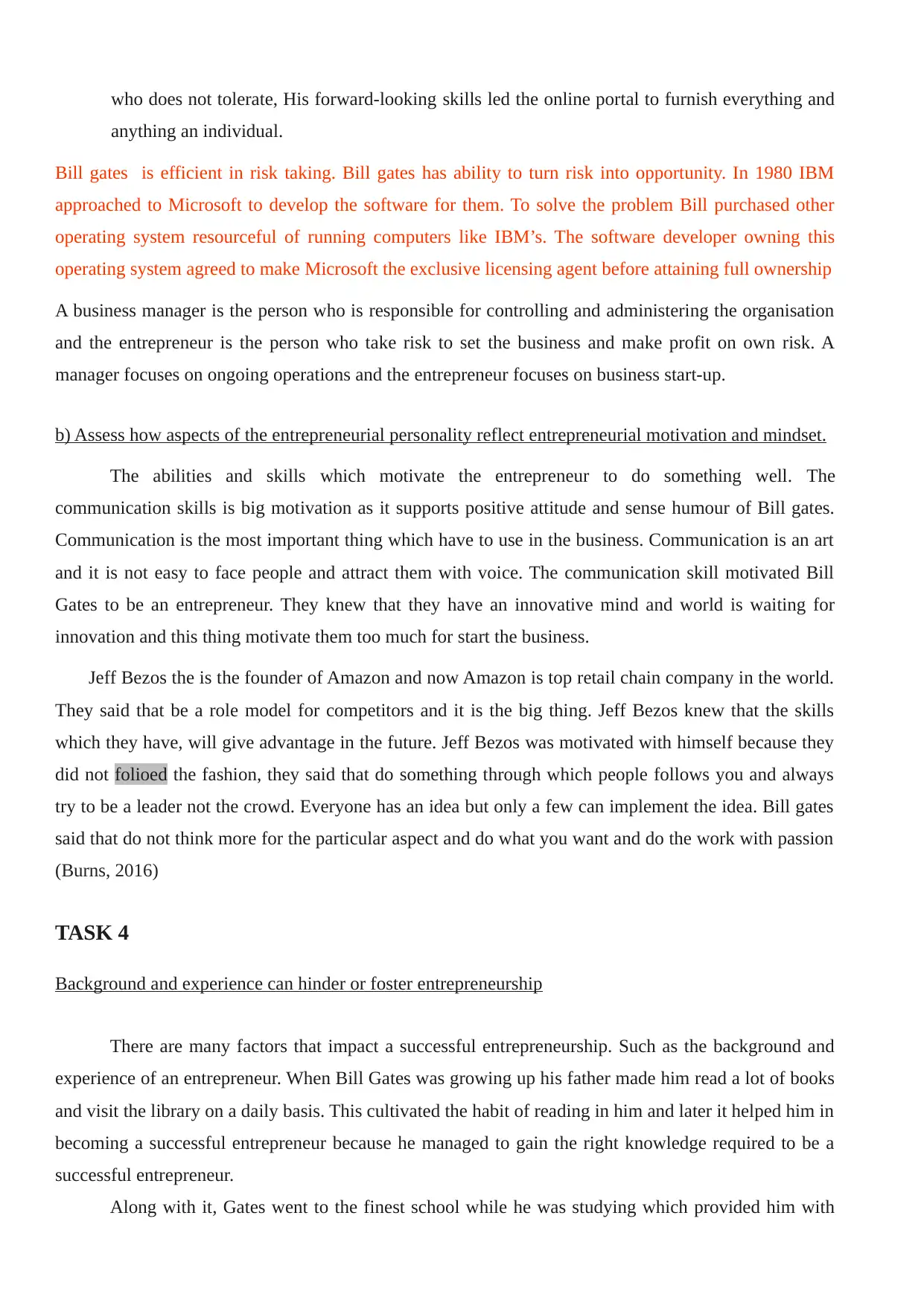
who does not tolerate, His forward-looking skills led the online portal to furnish everything and
anything an individual.
Bill gates is efficient in risk taking. Bill gates has ability to turn risk into opportunity. In 1980 IBM
approached to Microsoft to develop the software for them. To solve the problem Bill purchased other
operating system resourceful of running computers like IBM’s. The software developer owning this
operating system agreed to make Microsoft the exclusive licensing agent before attaining full ownership
A business manager is the person who is responsible for controlling and administering the organisation
and the entrepreneur is the person who take risk to set the business and make profit on own risk. A
manager focuses on ongoing operations and the entrepreneur focuses on business start-up.
b) Assess how aspects of the entrepreneurial personality reflect entrepreneurial motivation and mindset.
The abilities and skills which motivate the entrepreneur to do something well. The
communication skills is big motivation as it supports positive attitude and sense humour of Bill gates.
Communication is the most important thing which have to use in the business. Communication is an art
and it is not easy to face people and attract them with voice. The communication skill motivated Bill
Gates to be an entrepreneur. They knew that they have an innovative mind and world is waiting for
innovation and this thing motivate them too much for start the business.
Jeff Bezos the is the founder of Amazon and now Amazon is top retail chain company in the world.
They said that be a role model for competitors and it is the big thing. Jeff Bezos knew that the skills
which they have, will give advantage in the future. Jeff Bezos was motivated with himself because they
did not folioed the fashion, they said that do something through which people follows you and always
try to be a leader not the crowd. Everyone has an idea but only a few can implement the idea. Bill gates
said that do not think more for the particular aspect and do what you want and do the work with passion
(Burns, 2016)
TASK 4
Background and experience can hinder or foster entrepreneurship
There are many factors that impact a successful entrepreneurship. Such as the background and
experience of an entrepreneur. When Bill Gates was growing up his father made him read a lot of books
and visit the library on a daily basis. This cultivated the habit of reading in him and later it helped him in
becoming a successful entrepreneur because he managed to gain the right knowledge required to be a
successful entrepreneur.
Along with it, Gates went to the finest school while he was studying which provided him with
anything an individual.
Bill gates is efficient in risk taking. Bill gates has ability to turn risk into opportunity. In 1980 IBM
approached to Microsoft to develop the software for them. To solve the problem Bill purchased other
operating system resourceful of running computers like IBM’s. The software developer owning this
operating system agreed to make Microsoft the exclusive licensing agent before attaining full ownership
A business manager is the person who is responsible for controlling and administering the organisation
and the entrepreneur is the person who take risk to set the business and make profit on own risk. A
manager focuses on ongoing operations and the entrepreneur focuses on business start-up.
b) Assess how aspects of the entrepreneurial personality reflect entrepreneurial motivation and mindset.
The abilities and skills which motivate the entrepreneur to do something well. The
communication skills is big motivation as it supports positive attitude and sense humour of Bill gates.
Communication is the most important thing which have to use in the business. Communication is an art
and it is not easy to face people and attract them with voice. The communication skill motivated Bill
Gates to be an entrepreneur. They knew that they have an innovative mind and world is waiting for
innovation and this thing motivate them too much for start the business.
Jeff Bezos the is the founder of Amazon and now Amazon is top retail chain company in the world.
They said that be a role model for competitors and it is the big thing. Jeff Bezos knew that the skills
which they have, will give advantage in the future. Jeff Bezos was motivated with himself because they
did not folioed the fashion, they said that do something through which people follows you and always
try to be a leader not the crowd. Everyone has an idea but only a few can implement the idea. Bill gates
said that do not think more for the particular aspect and do what you want and do the work with passion
(Burns, 2016)
TASK 4
Background and experience can hinder or foster entrepreneurship
There are many factors that impact a successful entrepreneurship. Such as the background and
experience of an entrepreneur. When Bill Gates was growing up his father made him read a lot of books
and visit the library on a daily basis. This cultivated the habit of reading in him and later it helped him in
becoming a successful entrepreneur because he managed to gain the right knowledge required to be a
successful entrepreneur.
Along with it, Gates went to the finest school while he was studying which provided him with
Paraphrase This Document
Need a fresh take? Get an instant paraphrase of this document with our AI Paraphraser
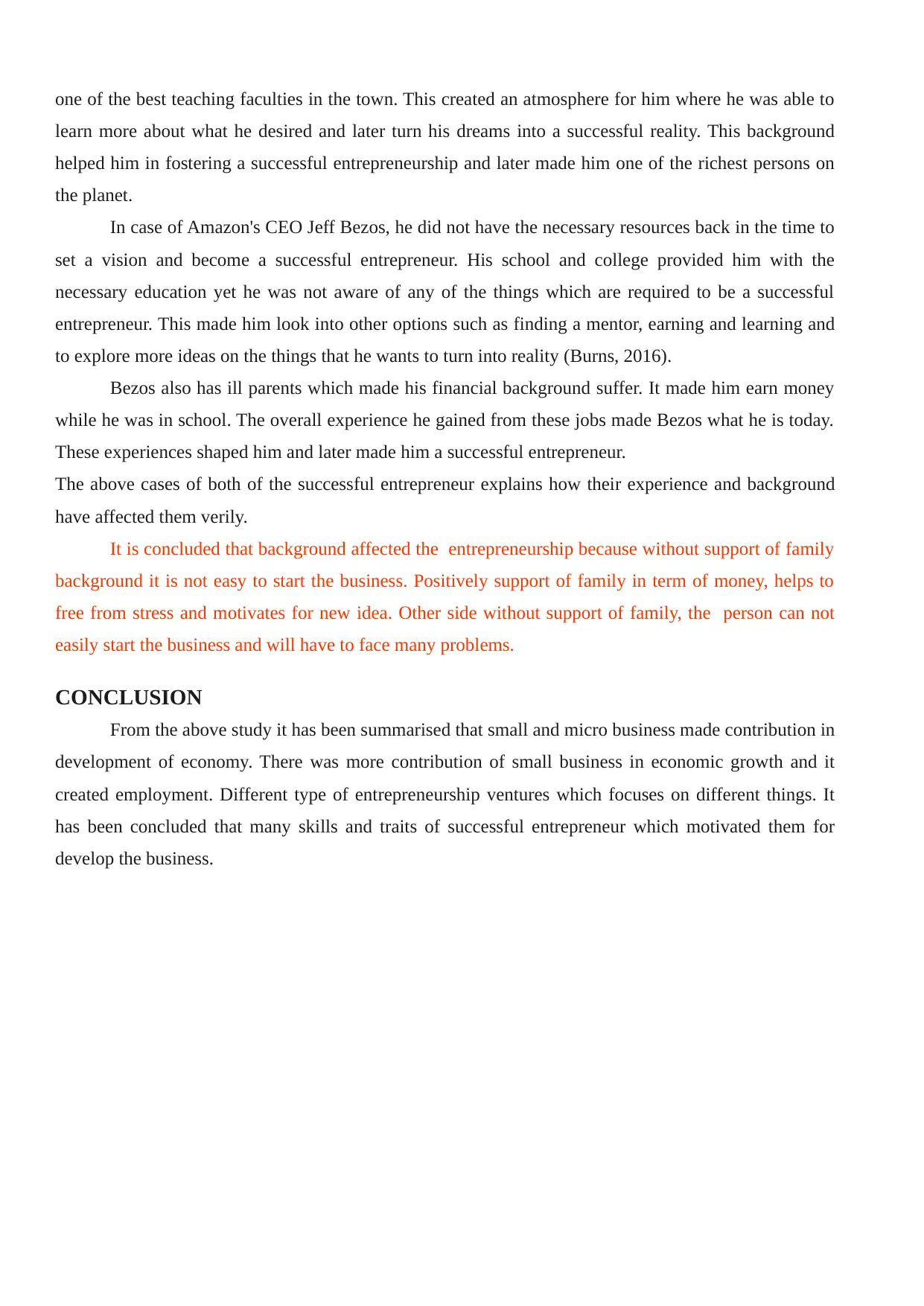
one of the best teaching faculties in the town. This created an atmosphere for him where he was able to
learn more about what he desired and later turn his dreams into a successful reality. This background
helped him in fostering a successful entrepreneurship and later made him one of the richest persons on
the planet.
In case of Amazon's CEO Jeff Bezos, he did not have the necessary resources back in the time to
set a vision and become a successful entrepreneur. His school and college provided him with the
necessary education yet he was not aware of any of the things which are required to be a successful
entrepreneur. This made him look into other options such as finding a mentor, earning and learning and
to explore more ideas on the things that he wants to turn into reality (Burns, 2016).
Bezos also has ill parents which made his financial background suffer. It made him earn money
while he was in school. The overall experience he gained from these jobs made Bezos what he is today.
These experiences shaped him and later made him a successful entrepreneur.
The above cases of both of the successful entrepreneur explains how their experience and background
have affected them verily.
It is concluded that background affected the entrepreneurship because without support of family
background it is not easy to start the business. Positively support of family in term of money, helps to
free from stress and motivates for new idea. Other side without support of family, the person can not
easily start the business and will have to face many problems.
CONCLUSION
From the above study it has been summarised that small and micro business made contribution in
development of economy. There was more contribution of small business in economic growth and it
created employment. Different type of entrepreneurship ventures which focuses on different things. It
has been concluded that many skills and traits of successful entrepreneur which motivated them for
develop the business.
learn more about what he desired and later turn his dreams into a successful reality. This background
helped him in fostering a successful entrepreneurship and later made him one of the richest persons on
the planet.
In case of Amazon's CEO Jeff Bezos, he did not have the necessary resources back in the time to
set a vision and become a successful entrepreneur. His school and college provided him with the
necessary education yet he was not aware of any of the things which are required to be a successful
entrepreneur. This made him look into other options such as finding a mentor, earning and learning and
to explore more ideas on the things that he wants to turn into reality (Burns, 2016).
Bezos also has ill parents which made his financial background suffer. It made him earn money
while he was in school. The overall experience he gained from these jobs made Bezos what he is today.
These experiences shaped him and later made him a successful entrepreneur.
The above cases of both of the successful entrepreneur explains how their experience and background
have affected them verily.
It is concluded that background affected the entrepreneurship because without support of family
background it is not easy to start the business. Positively support of family in term of money, helps to
free from stress and motivates for new idea. Other side without support of family, the person can not
easily start the business and will have to face many problems.
CONCLUSION
From the above study it has been summarised that small and micro business made contribution in
development of economy. There was more contribution of small business in economic growth and it
created employment. Different type of entrepreneurship ventures which focuses on different things. It
has been concluded that many skills and traits of successful entrepreneur which motivated them for
develop the business.
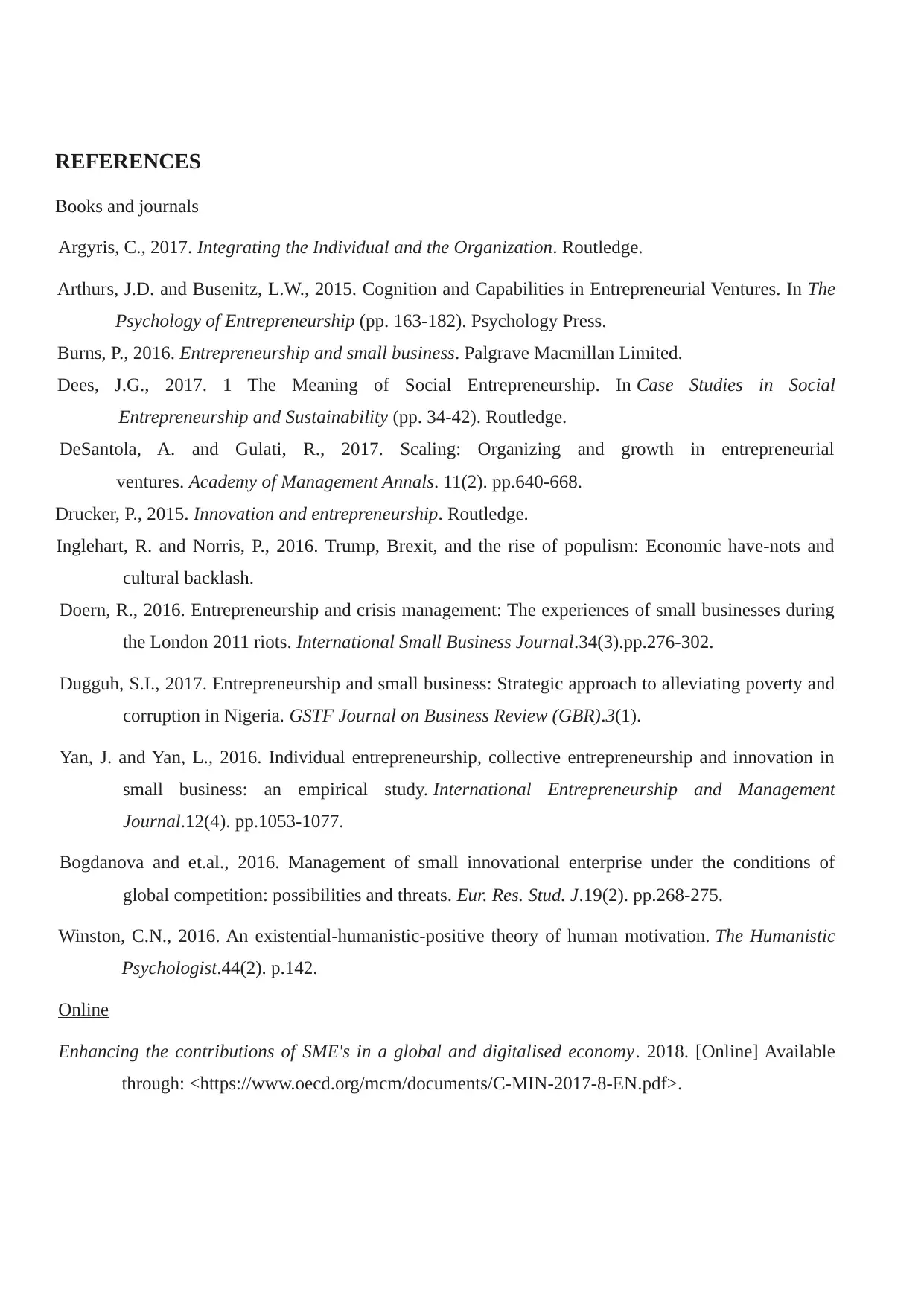
REFERENCES
Books and journals
Argyris, C., 2017. Integrating the Individual and the Organization. Routledge.
Arthurs, J.D. and Busenitz, L.W., 2015. Cognition and Capabilities in Entrepreneurial Ventures. In The
Psychology of Entrepreneurship (pp. 163-182). Psychology Press.
Burns, P., 2016. Entrepreneurship and small business. Palgrave Macmillan Limited.
Dees, J.G., 2017. 1 The Meaning of Social Entrepreneurship. In Case Studies in Social
Entrepreneurship and Sustainability (pp. 34-42). Routledge.
DeSantola, A. and Gulati, R., 2017. Scaling: Organizing and growth in entrepreneurial
ventures. Academy of Management Annals. 11(2). pp.640-668.
Drucker, P., 2015. Innovation and entrepreneurship. Routledge.
Inglehart, R. and Norris, P., 2016. Trump, Brexit, and the rise of populism: Economic have-nots and
cultural backlash.
Doern, R., 2016. Entrepreneurship and crisis management: The experiences of small businesses during
the London 2011 riots. International Small Business Journal.34(3).pp.276-302.
Dugguh, S.I., 2017. Entrepreneurship and small business: Strategic approach to alleviating poverty and
corruption in Nigeria. GSTF Journal on Business Review (GBR).3(1).
Yan, J. and Yan, L., 2016. Individual entrepreneurship, collective entrepreneurship and innovation in
small business: an empirical study. International Entrepreneurship and Management
Journal.12(4). pp.1053-1077.
Bogdanova and et.al., 2016. Management of small innovational enterprise under the conditions of
global competition: possibilities and threats. Eur. Res. Stud. J.19(2). pp.268-275.
Winston, C.N., 2016. An existential-humanistic-positive theory of human motivation. The Humanistic
Psychologist.44(2). p.142.
Online
Enhancing the contributions of SME's in a global and digitalised economy. 2018. [Online] Available
through: <https://www.oecd.org/mcm/documents/C-MIN-2017-8-EN.pdf>.
Books and journals
Argyris, C., 2017. Integrating the Individual and the Organization. Routledge.
Arthurs, J.D. and Busenitz, L.W., 2015. Cognition and Capabilities in Entrepreneurial Ventures. In The
Psychology of Entrepreneurship (pp. 163-182). Psychology Press.
Burns, P., 2016. Entrepreneurship and small business. Palgrave Macmillan Limited.
Dees, J.G., 2017. 1 The Meaning of Social Entrepreneurship. In Case Studies in Social
Entrepreneurship and Sustainability (pp. 34-42). Routledge.
DeSantola, A. and Gulati, R., 2017. Scaling: Organizing and growth in entrepreneurial
ventures. Academy of Management Annals. 11(2). pp.640-668.
Drucker, P., 2015. Innovation and entrepreneurship. Routledge.
Inglehart, R. and Norris, P., 2016. Trump, Brexit, and the rise of populism: Economic have-nots and
cultural backlash.
Doern, R., 2016. Entrepreneurship and crisis management: The experiences of small businesses during
the London 2011 riots. International Small Business Journal.34(3).pp.276-302.
Dugguh, S.I., 2017. Entrepreneurship and small business: Strategic approach to alleviating poverty and
corruption in Nigeria. GSTF Journal on Business Review (GBR).3(1).
Yan, J. and Yan, L., 2016. Individual entrepreneurship, collective entrepreneurship and innovation in
small business: an empirical study. International Entrepreneurship and Management
Journal.12(4). pp.1053-1077.
Bogdanova and et.al., 2016. Management of small innovational enterprise under the conditions of
global competition: possibilities and threats. Eur. Res. Stud. J.19(2). pp.268-275.
Winston, C.N., 2016. An existential-humanistic-positive theory of human motivation. The Humanistic
Psychologist.44(2). p.142.
Online
Enhancing the contributions of SME's in a global and digitalised economy. 2018. [Online] Available
through: <https://www.oecd.org/mcm/documents/C-MIN-2017-8-EN.pdf>.
⊘ This is a preview!⊘
Do you want full access?
Subscribe today to unlock all pages.

Trusted by 1+ million students worldwide
1 out of 12
Related Documents
Your All-in-One AI-Powered Toolkit for Academic Success.
+13062052269
info@desklib.com
Available 24*7 on WhatsApp / Email
![[object Object]](/_next/static/media/star-bottom.7253800d.svg)
Unlock your academic potential
Copyright © 2020–2026 A2Z Services. All Rights Reserved. Developed and managed by ZUCOL.





